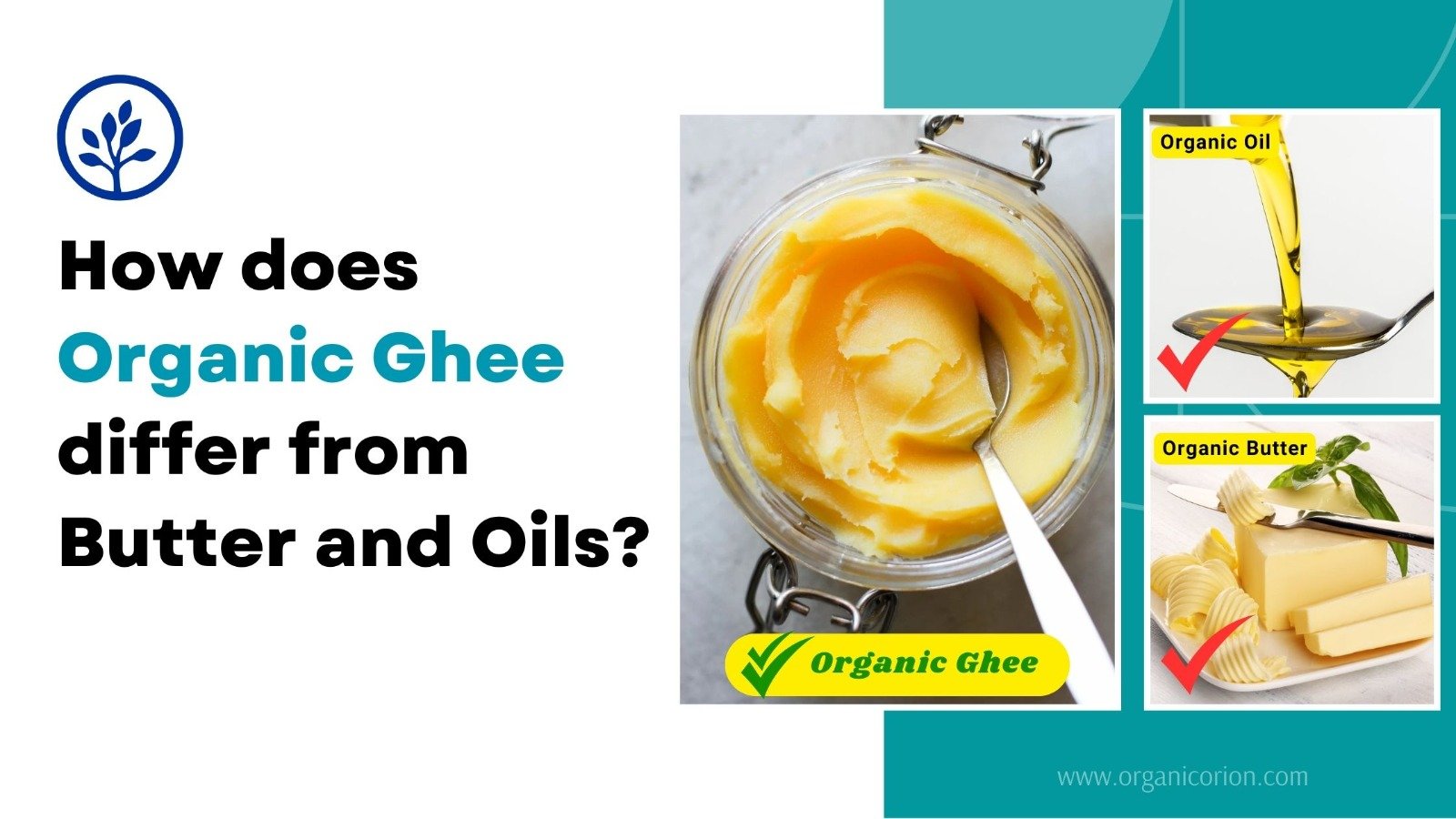Organic ghee is a healthier choice compared to oils and butter. Here's why: it's made from natural ingredients, contains beneficial nutrients, and is free from harmful additives. Plus, it's rich in antioxidants and good fats, promoting overall well-being. Choosing organic ghee over oils and butter provides a tasty and nutritious alternative for a healthier lifestyle.
Organic Butter:
Butter, a familiar ingredient, originates from the same source as ghee but undergoes a distinct process. Produced by churning cream, it retains water and milk solids, resulting in a creamy texture, distinctive flavor, and a lower heat point compared to ghee. While butter offers beneficial nutrients, its higher water content limits shelf stability.
Organic oils for cooking:
Vegetable oils such as olive oil, coconut oil, and canola oil not only add flavor but also contribute to a healthy diet. These oils are extracted from various plants and contain a variety of fatty acids. The unique tastes they offer make them popular choices in cooking. Incorporating these oils into your meals can enhance both the flavor and nutritional value of your dishes, providing a good balance of essential fats. Their diverse profiles make them versatile for different cooking needs, contributing to a well-rounded and flavorful culinary experience.
Nutritional Functions:
Organic ghee is unique in its nutrition. By removing water and milk solids, it becomes a high-fat product with a distinct type of fat. It's rich in saturated fats, which are great for cooking at high temperatures without getting harmed. Additionally, ghee contains vitamins A, E, and D.
What's in butter?
Butter shares nutrient similarities with ghee but has water and milk solids, making it less suitable for high-temperature cooking. While it provides a creamy texture to dishes and contains beneficial fat-soluble vitamins, its composition makes it prone to burning at higher temperatures. Despite these differences, butter can still enhance the flavor and texture of various dishes, offering a richness that complements certain cooking methods.
Different Oils, Different Benefits:
Many oils offer health benefits. Olive oil, rich in heart-healthy fats and antioxidants, is good for the heart. Coconut oil, with its medium-chain triglycerides (MCTs), may aid metabolism. However, some oils lose their beneficial properties during processing. It's essential to choose oils based on their unique qualities and consider factors like cooking methods, as oils vary in their heat tolerance. Making informed choices about oils can contribute to a well-rounded and healthy diet.
Easy Cooking with Organic Ghee:
Having organic ghee in your kitchen is fantastic because it can handle high temperatures without any problems. It's perfect for cooking methods like sautéing, frying, and baking. Unlike butter, which doesn't do well with very hot cooking, ghee can handle it without breaking down. This means you can use it for a variety of dishes that need high heat. It adds a delicious flavor while keeping the food nice and crispy. So, if you want to make tasty and crispy meals, organic ghee is a great choice for your kitchen.
Possible Good Things for Health:
Enjoying the right amount of organic ghee can be good for your health. It contains CLA, which is linked to reducing inflammation and potentially managing weight. The fats in ghee play a role in making you feel full, which can be helpful for controlling how much you eat. This natural fat can be part of a balanced diet, adding both flavor and potential health benefits to your meals. Remember, moderation is key, as consuming it in the right amounts ensures you get the positive aspects without overdoing it. So, including organic ghee in your diet can be a tasty and beneficial choice.
Getting the Perfect Balance Between Butter and Oils:
Butter provides essential vitamins A and D, yet its use in high-heat cooking is limited. Oils offer diverse fats and nutrients, but their cooking methods and processing require careful consideration. Striking a balance between using butter and oils is crucial for achieving a mix of nutrients while ensuring meals are both tasty and healthy.
In the realm of cooking, various options like oils, ghee, and butter each bring their unique qualities to the table. Organic ghee, in particular, stands out due to its ability to handle high heat and potential health benefits. Its concentrated richness adds a distinctive flavor to dishes, making it a versatile choice for cooking. Unlike some other fats, organic ghee has a higher smoke point, which means it can endure higher temperatures without breaking down or producing harmful compounds. Additionally, it contains certain fatty acids and fat-soluble vitamins that may contribute to its potential health benefits. Exploring these culinary options and understanding their attributes empowers individuals to make informed choices, ensuring a harmonious blend of taste and nutrition in every dish they prepare. Consider incorporating organic ghee into your cooking routine to savor its unique qualities and enhance your culinary experience.

